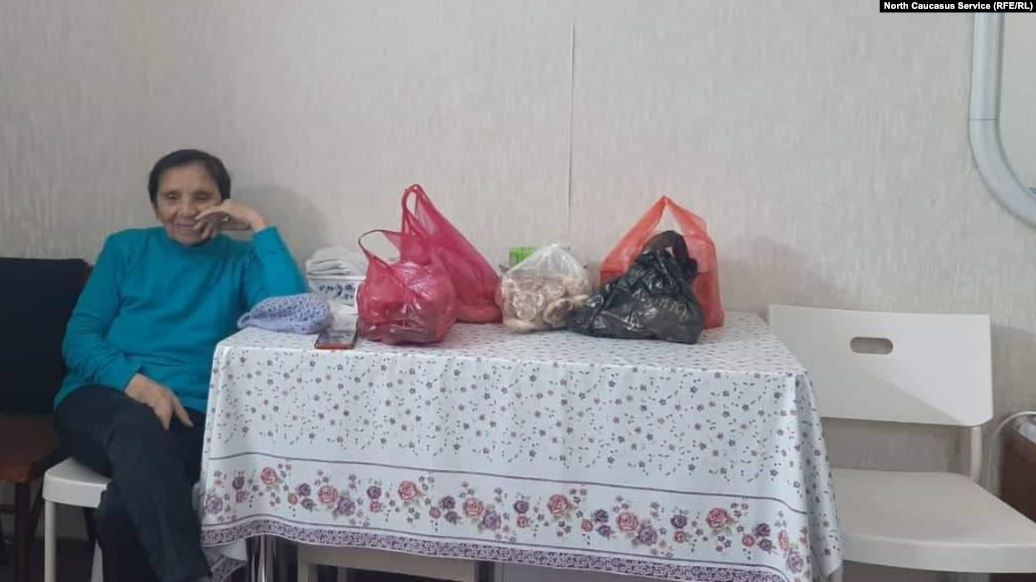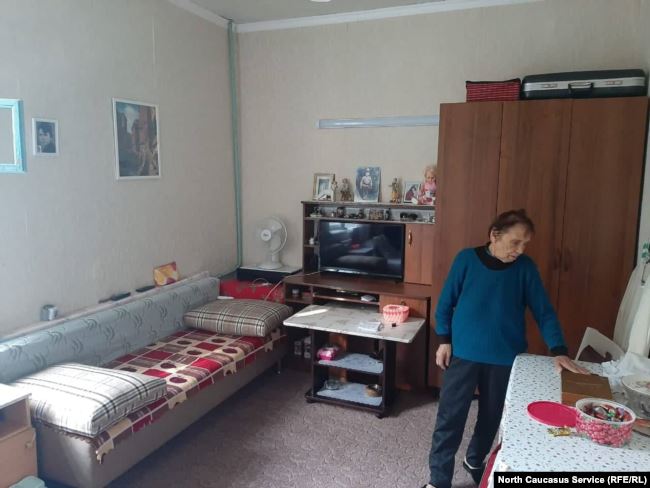

Circassian woman Shaziya Nukh is 86 years old. In 2011, she fled the Syrian conflict to Kabardino-Balkaria, the homeland of her ancestors. Almost all of her relatives died during the bombing of Aleppo. Shaziya has no income and no housing.
‘I obtained a residence permit in Russia in 2016 and now have to wait for citizenship for at least another six years — and it’s a big question whether they grant it to me or not. But, even if they do, what will happen after? I will still have no job, and as a result, not even a meager income. Anyways, I wouldn’t be able to work anywhere — I’m too old!’
‘I’m not completely alone here. My niece lives in Kabardino-Balkaria, she has moved here, to Nalchik, from Syria before the war started. She keeps telling me to come and live with her, but they themselves live in utter poverty: five people squeezed into a one-room apartment. Of course, I refuse. They help me as much as they can: they bring food, they visit me, but even that is a burden for them.’
‘When I arrived here, to Nalchik, me and several other families were given accomodations in the Druzhba sanatorium. It was relatively comfortable, but we were soon evicted from there and the rooms we stayed in were used to house refugees from the Ukrainian Donbass.’
‘There was nothing here — no doors, no plumbing, no floors’
‘As part of program to help repatriates, the local authorities allocated a room in a dilapidated sanatorium for me. The room was in a terrible state: the ceiling was crumbling, the walls were covered with fungus, and the toilet and bathroom were missing.
Once, after it had rained, the ceiling completely fell in, and a wooden support beam fell straight onto my sofa. Fortunately for me, I had already gotten up by then and was not, as I usually am, lying down. After that, I was sent to live with another family and, some time after, I was given this room.’
‘Apparently, this room had not been repaired for many years […] In a word, there was nothing — no doors, no plumbing, no floors. We repaired everything by ourselves, with the help of volunteers.

‘Now you can at least sleep here, and cook something on a small electric stove. The furniture that I have: a bed, a small table, a cupboard, are presents given to me by kind people.’
‘The only thing I wish for now is to move from this place to a one-room apartment. Let it be a state-owned apartment, and after my death it can be handed over to someone else, especially since I do not have long to live.’
‘I just wish to live what’s left of my life as a human being. I wish to be able to have a bath or a shower, to wash and dry my clothes, to cook things. I wish to see the sun through the window in the morning. Now I am ashamed to even invite someone for a cup of tea!’
‘If there was a place to return to, I would return’
‘We all used to dream of returning to the homeland of our ancestors — both my father and mother, and my brothers and sisters. We dreamt and thought that we would save money so that we could buy a house in Kabarda and settle well, and that we would move here. Now it’s funny and bitter to even remember this!’
‘If there was a place to return to, I would return without hesitation. There, in Aleppo, before the war, I had everything: a beautiful, richly furnished, solid house; relatives, people who loved me and who I loved in return. All my family members were employed and had good incomes. I had two cars.’
‘In Aleppo, I worked as a teacher in a daycare. Unlike in Kabardino-Balkaria, in Syria, the job of a daycare or a school teacher is considered prestigious and well paid.’
‘There I felt protected, both by my relatives and by the state. Of course, there were those who lived worse than us, but I did not see poor and homeless people. I don’t know who needed this war. We worked, lived, and never thought about politics.’
‘All of it collapsed overnight. Someone decided to destroy our city, our home, our whole life, to wipe it off the surface of the earth, and I ended up here. Maybe it would be much easier for me if not for the memory of my past prosperous life that I see in my dreams — then I wake up and see these walls, and I don’t want to live any more.’
‘I am grateful to the local fellows who brought me a TV and installed a satellite dish. Thanks to the television, which is my only amusement, I can watch programs in Arabic. From these television programs I understand that, despite the relative lull in Syria, the war there will not end soon.’
‘All my dreams turned to dust very quickly’
‘I wasn’t thinking that my native land would be so inhospitable for me. On my way here — first changing vehicles until the Turkish border, and then by plane to Russia — I kept dreaming: I would arrive to Kabarda, the home of my great-grandfather, and I would be greeted by loving compatriots that would help me get settled somehow.’
‘All my dreams turned to dust very quickly. Nobody needs us here.’
‘I spent my last savings on arranging my departure, the hard journey from Syria, and on the paperwork necessary for entering Russia and processing a lot of bureaucratic papers. Now I am poor, and I think it would have been better for me to die there, in Aleppo, although even there I have nothing left — neither relatives, nor a home.’
‘My brother and sister who lived with me in Aleppo died during the bombing, and of our beautiful home, only a pile of crumpled ferroconcrete remained. Their children and their families left when the first attacks started.’
‘In order to try to track them down, I wrote to Damascus, tried to find something out through mutual acquaintances, requested information from both official authorities and Syrian refugee camps in Jordan and Turkey, but it was all in vain. I think that, at best, they roam somewhere, and at worst they’ve died, like thousands of other peaceful Syrians.’
‘Assistance programs for repatriates do not apply to Circassians, for some reason’
‘Here, help or offers of help and services, mainly come from those who themselves can barely make ends meet. There is no help from the state.’
‘More than once, local residents have suggested that I live with them. I remember one woman. She is divorced from her husband, has two small children to look after, and earns money by cleaning offices and harvesting fruits, and still she offered me to come and live with her. But I can’t accept help from those who themselves need help and care. I don’t want to be a burden to good people.’
‘There are various state programs to help repatriates, but for some reason they do not apply to Circassians coming from abroad. For example, I cannot even get disability benefits here. In order to get them, one needs to work somewhere for several months — but who will hire an old woman who is over 80 years old?’
‘I want to express gratitude to those who, through social networks, fundraise for repatriates, and for others who participate in the networks. From time to time, this is how I get money to buy food and medicine.








